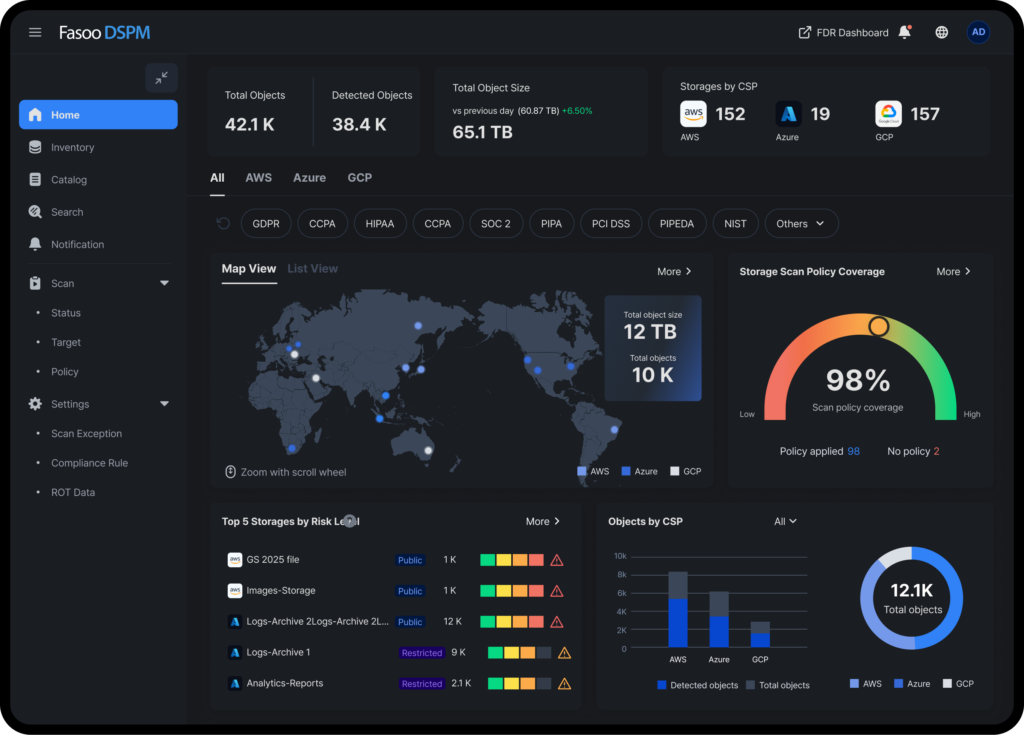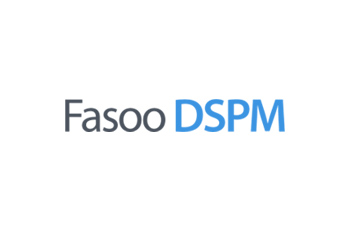
Organizations store vast amounts of data across various environments – PCs, servers, external storage, and, increasingly, multi-cloud and hybrid environments. As the adoption of SaaS and cloud storage grows, critical data often becomes scattered, making it harder to track and manage. Unmanaged data, such as dark data and ROT (redundant, obsolete, trivial) data, pose significant security risks. Many organizations struggle with limited visibility into their data’s location and security status.
Fasoo DSPM (Data Security Posture Management) addresses these challenges by providing automated discovery, classification, and analysis of data across on-premises and cloud environments. It evaluates security risks by analyzing access controls and repository vulnerabilities, uncovering unmanaged data, and offering continuous monitoring. This comprehensive approach ensures that organizations maintain a robust security posture and comply with regulatory requirements.
Fasoo DSPM automatically discovers and classifies sensitive data across on-prem, cloud, and SaaS platforms. It provides real-time insights into where data is stored, who has access, and how it is being used.

Track the security status of your data with a centralized dashboard. Identify vulnerabilities, assess access controls, and monitor compliance across all repositories in one place.

Detect and classify information across structured and unstructured data. Gain visibility into where critical data resides, who has access, and how it’s used.

Unlike traditional DSPM solutions, Fasoo DSPM maps data movement across cloud, local storage, and file servers, offering a complete view of how data flows within your organization.

Analyze security risks and storage vulnerabilities with advanced security filters. Identify blind spots and gain a fast, precise understanding of your organization’s security posture.
Set and apply detailed security policies based on cloud service providers (CSPs), compliance requirements, access controls, and more – ensuring consistent protection across all data environments.
Fasoo DSPM delivers comprehensive visibility into your data security status across multi-cloud and hybrid environments by identifying and classifying data in various repositories. The solution scans and maps objects by CSP, compliance regulation, ACL status, and object extension. Leveraging its advanced monitoring capabilities, Fasoo DSPM analyzes vulnerabilities in data assets and offers actionable guidelines to help maintain a robust security posture.

Manage Dark Data and Protect Sensitive Customer Data
Reduce Redundancy and Enhance Data Integrity
Challenges
A global Financial Institution S faces growing concerns over the management of sensitive customer information, such as Personally Identifiable Information (PII), account details, and transaction histories. As the digital transformation accelerates, data is increasingly scattered across multiple repositories, including cloud platforms, on-premises databases, and file servers. This leads to a rise in unmonitored and unmanaged dark data, which poses a significant security risk. The institution lacks visibility into where sensitive data is stored, how it is being accessed, and whether it is properly protected. These blind spots not only heighten the risk of unauthorized data exposure but also make it challenging to maintain compliance with stringent regulations like GDPR, CCPA, and PDPA.
Solutions
To address these challenges, the financial institution implements Fasoo DSPM to gain control over dark data and enhance the security of sensitive information. Fasoo DSPM provides the following capabilities:
Benefits
By implementing Fasoo DSPM, the financial institution gains comprehensive visibility into all enterprise data, reducing the risk of breaches and ensuring sensitive customer information remains protected. Customizable detection policies enable compliance with data privacy regulations, while automated security controls reduce security risks, optimize data management, and improve operational efficiency.
Challenges
A leading Healthcare Research Institution E faces significant challenges in managing large volumes of medical data, including biometric information, patient treatment records, and clinical research datasets. Frequent data backups, file duplication, and manual data handling lead to inconsistencies and redundant copies across storage systems. These issues compromise the accuracy and reliability of data analysis, which is critical for research outcomes. Additionally, redundant data significantly increases cloud storage costs, straining the institution’s operational budget and resources.
Solutions
The institution implements Fasoo DSPM to address these challenges. Fasoo DSPM provides:
Benefits
With Fasoo DSPM, the healthcare institution achieves significant improvement in data integrity and operational efficiency. By identifying and removing redundant copies, the organization enhances the consistency and reliability of medical data used for research, leading to more accurate analysis and trusted results. The streamlined data management also reduces cloud storage requirements, resulting in lower operational costs. Fasoo DSPM enables the institution to maintain high-quality data governance, ensuring sensitive medical information is secure, well-managed, and optimized for critical research activities.



Brochures
Fasoo DSPM offers a proactive approach to today's data security challenges by enabling organizations to gain complete visibility and control over their data.

Press Release
Fasoo launches Fasoo DSPM, a comprehensive platform designed to help organizations gain complete visibility and control over their sensitive and regulated data.

Videos
Learn how Fasoo's DSPM identifies potential risks and vulnerabilities, implements proper controls, and maintains data visibility throughout its entire lifecycle.

Blog
Data privacy has become a critical concern for organizations worldwide. Learn how Fasoo helps organizations avoid hefty fines, maintain customer trust, and protect sensitive information.
Fasoo DSPM is a data security posture management solution that provides complete visibility and control over sensitive data across on-premises, cloud, and SaaS environments. It discovers and classifies all data to identify security and compliance risks. By assessing data vulnerabilities and access controls, it helps organizations reduce data exposure, ensure compliance, and strengthen security posture with centralized monitoring and actionable insights.
Data Security Posture Management (DSPM) is a strategic approach in cybersecurity that focuses on identifying, monitoring, and improving the security of an organization’s data. It provides comprehensive visibility into where sensitive data resides, how it is being used, and who has access to it, across various environments. By analyzing potential vulnerabilities in access controls, storage locations, and data flows, DSPM enables organizations to uncover unmanaged or hidden data, such as redundant or outdated files, which may pose security risks.
The goal of DSPM is to proactively mitigate risks, ensure compliance with regulatory requirements, and maintain strong security controls to protect sensitive information throughout its lifecycle. This approach empowers organizations to make data-driven decisions to strengthen their overall cybersecurity posture.
Data Security Posture Management (DSPM) focuses on discovering, monitoring, and securing sensitive data across all environments, including on-premises, cloud, and SaaS applications. DSPM helps organizations understand where their critical data is stored, who has access to it, and whether it is adequately protected. By analyzing data movement, access controls, and security risks, DSPM ensures that sensitive information remains secure and compliant.
Cloud Security Posture Management (CSPM) is designed to assess and improve the security of cloud infrastructure. It helps organizations identify misconfigurations, enforce security policies, and mitigate risks related to cloud environments. CSPM focuses on securing cloud services, workloads, and networks by ensuring proper configurations and compliance with industry practices.
While CSPM is useful for securing cloud configuration, it does not provide comprehensive visibility into the data itself. It focuses on securing cloud environments rather than tracking sensitive information, making it insufficient for true data protection. Organizations relying solely on CSPM may think their cloud is secure – yet without DSPM, their most valuable asset, their data, remains vulnerable once it is exposed within the cloud. For complete security, DSPM is not just an option – it’s a necessity.
Identity and Access Management (IAM) ensures that only authorized users have appropriate access to an organization’s systems, applications, and data. It helps verify user identities, manage permissions, and enforce security rules to prevent unauthorized access. However, IAM does not provide visibility into how data is used, where it moves, or whether it is at risk. DSPM complements IAM by ensuring that sensitive data remains secure even after access is granted, reducing the risk of data leaks and compliance violations.
Endpoint Detection and Response (EDR) focuses on identifying and mitigating threats on endpoints such as laptops, servers, and mobile devices. However, EDR does not track or secure sensitive data itself – leaving organizations vulnerable to data exposure even if endpoint threats are contained. DSPM complements EDR by ensuring that organizations can detect potential data exposure and apply appropriate protection measures before a breach occurs. Integrating DSPM with EDR enables a more comprehensive approach to data security, covering both endpoint threats and broader data security risks.
Security Information and Event Management (SIEM) collects and analyzes security logs to detect and respond to threats, providing valuable insights into security incidents. However, SIEM does not offer complete visibility into where sensitive data resides or whether it is properly secured. DSPM complements SIEM by continuously discovering, classifying, and monitoring sensitive data across cloud, on-prem, and SaaS environments. By integrating DSPM with SIEM, organizations can correlate security events with data risk insights, ensuring a more comprehensive approach to threat detection, data security, and regulatory compliance.
Data Security Posture Management (DLP) focuses on preventing sensitive data from leaving the organization by monitoring and blocking unauthorized transfers, emails, and downloads. While effective in controlling data movement, DLP does not provide actionable insights into security risks and storage vulnerabilities. DSPM complements DLP by providing a broader, more proactive approach to ensure that sensitive data is protected and compliance is maintained across all storage and access points. Integrating DSPM with DLP enhances the organization’s ability to prevent data breaches while ensuring proper data management and security controls.
Join us to learn how to protect your unstructured data at rest, in transit, and in use in today’s AI-powered, hybrid workd environment.